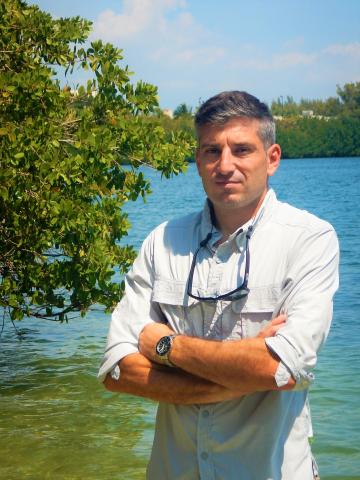Guillaume Rieucau
 Ph.D. Biology. 2010. Université du Québec à Montréal, QC, Canada
Ph.D. Biology. 2010. Université du Québec à Montréal, QC, Canada
M.Sc. Biology. 2005. Université du Québec à Montréal, QC, Canada
M.Sc. Populations and Ecosystems Biology. 2002. Université Paul Sabatier, Toulouse, France
B.A. Organisms ans Population Biology. 2001. Université Paul Sabatier, Toulouse, France
My research examines the functions and mechanisms of collective behaviors in animals with a particular focus on marine and estuarine organisms (from bait fish to marine top predators). I explore how fish schools form, maintain and collectively react to external factors such as predators, environmental factors, human disturbances and habitat structure. My main research goal is to gain deeper understanding of how group-living animals collectively respond to a fluctuating environment over ecological and evolutionary timescales to address ecological and conservation issues. In addition, I am developing an innovative framework that uses fish behaviors as bio-indicators for impact studies and restoration programs in coastal and marine environments.
CURRENT PROJECTS
- Functions and mechanisms of fish collective behavior in dynamic environments
- Information transfer in fish schools
- Role of behavior in structuring nektonic communities and trophic interactions
- Mapping the “Landscape of Fear” in marine and coastal ecosystems
- Use of behavioral responses of aquatic organisms as bioindicators in impact studies
- Forecasting aggregative dynamics of ecologically and economically important species using behavior-based models
SELECTED PUBLICATIONS
Rieucau G., Kiszka J.J., Castillo J.C., Mourier J., Boswell K.M. & Heithaus M.R. 2018. Using unmanned aerial vehicle (UAV) surveys and image analysis in the study of large surface-associated marine species: a case study on reef sharks Carcharhinus melanopterus shoaling behaviour. Journal of Fish Biology. Online first.
Johnsen E., Rieucau G., Ona E. & Skaret G. Collective structures anchor massive lesser sandeel schools to the seabed increasing vulnerability to fishery. Marine Ecology Progress Series. 573: 229-236.
Handegard N.O., Holmin A.J. & Rieucau G. 2017. Method to observe large scale behavioural waves spanning entire fish schools using 4D sonar. ICES Journal of Marine Science. 4: 804-812.
Rieucau G., Holmin A.J. *, Castillo J.C., Couzin, I.D. & Handegard N.O. 2016. School-level structural and dynamic adjustements to risk promote information transfer and collective evasion in herring. Animal Behaviour. 117: 69-78.
Rieucau G., Doksæter Sivle L. & Handegard N.O. 2016. Schooling herring perform stronger collective anti-predator reactions when previously exposed to killer whales calls. Behavioral Ecology. 27: 538-544.
Rieucau G., Boswell K.M, Kimball M.E, Diaz G. **& Allen D.M. 2015. Tidal and diel variations in abundance and schooling behavior of estuarine fish within an intertidal salt marsh creek. Hydrobiologia. 753: 149-162.
Rieucau G., Fernö A., Ioannou C.C. & Handegard N.O. 2015. Towards a firmer explanation of large shoal formation, maintenance and collective reactions in marine fish. Reviews in Fish Biology and Fisheries. 25:25-37.
Rieucau G., De Robertis A., Boswell K.M. & Handegard N.O. 2014. School density affects the strength of collective antipredatory responses in wild-caught herring (Clupea harengus): A simulated predator encounter experiment. Journal of Fish Biology. 85: 1650-1664.
Rieucau G., Boswell K.M., De Robertis A., Macaulay G.J. & Handegard N.O. 2014. Experimental evidence of threat-sensitive collective avoidance responses in a large wild-caught herring school. PLoS ONE. 9: e86726.
Rieucau G. & Giraldeau L.A. 2011. Exploring the costs and benefits of social information use: an appraisal of current experimental evidence. Philosophical Transactions of the Royal Society B: Biological Sciences. 366: 949-957.
